#Master of Chaplaincy
Explore tagged Tumblr posts
Text
Available in Paperback Today!!! The Medium's Medium Tracey Lockwood Has a Quote on the Back Cover!
IN THEIR IMAGE AND LIKENESS is available in paperback today on Amazon, Barnes & Noble and anywhere books are sold. Reverend Medium, Tracey Lockwood has a quote on the back cover of my book which reads, “Get ready to take a deep dive. Metaphysician Lin Hourihan offers s multifaceted perspective on who we are at the core of our being. Challenging preconceptions and lending insight on how to…
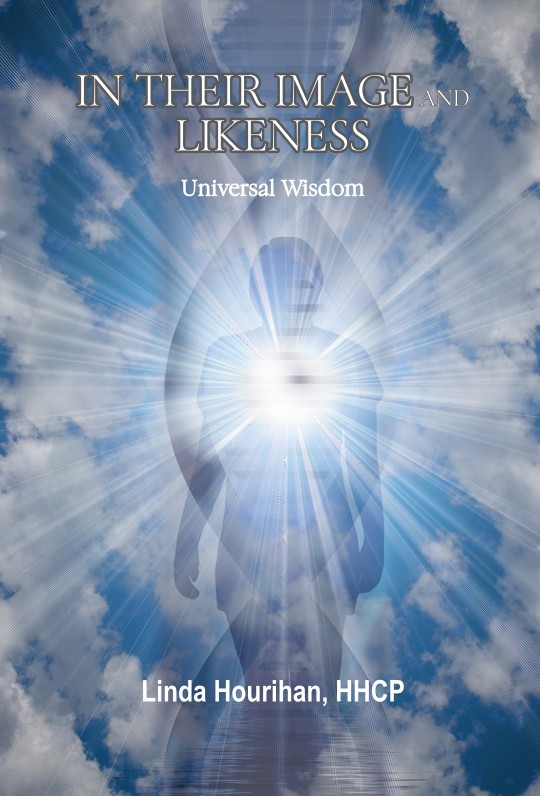
View On WordPress
#Bible#Bible Study#Doctor of Universal Order&039; Doctor of Spiritual Awareness#Father#God#health#holistic#holistic health#Holy Spirit#IN THEIR IMAGE AND LIKENESS#Jesus#Lin Hourihan#Linda Hourihan#Love#love is the answer#Master of Chaplaincy#mother#New Testament#Old Testament#Peace#Tracey Lockwood#universal#UNIVERSAL WISDOM#wisdom
0 notes
Note
Please ignore this if I'm being greedy, but did you pick the next fic you would be working on? 😊
air force chaplain john won out...
“Well, look who it is,” he calls, kicking a foot back against the wall to push himself forward.
On the path, Gale Cleven tips and swivels, closing the distance between them with an outstretched hand. His hands are rougher than John’s, because even the smart boys don’t get nothing for free out West, but his grip has eased to less of a fanciful red-blooded display into something that better suits the sweet curve of his features. Firm, polite, slow to fall away.
They meet in Texas. John does his chaplaincy training over in Massachusetts before travelling down to the airfield there, catching Gale at just the wrong angle that he’s sure he’s Buck from Manitowoc. Now he’s Buck from Casper, a cowboy that doesn’t drink or smoke but could count pretty decent and fly the hell out of one of those big birds.
“Father Egan,” Gale greets.
“Quit making me sound like I’m a hundred, Buck,” he says. “You just fly in?”
“Just yesterday,” he says.
He talks around a toothpick, hands returning to the pockets of his jacket. The morning breeze lifts but does not toss his hair around, already mastered in his presence. John likes looking at him the same way he supposes man first thought to paint what was beautiful; to preserve and indulge, somewhere, somehow in fear of its impermanence.
#me @ me: is this too gay off the bat#the plot is just john getting beat with a proverbial stick the entire time#ask
12 notes
·
View notes
Text
Hounds of Terra Lore Overview
Ok, I've been trying to get more of this stuff written down, so here's a crack at that. This is just bullet points and timelines, though I am trying to improve my writing skills enough to throw together a short story down the line.

The Hounds of Terra are a successor chapter of the Brazen Claws, established as part of the 23rd founding in late M37. They were granted the world of Euros IV on the furthest reaches of the eastern fringe as a chapter homeworld. The intent with their founding was to secure the region and allow for the withdrawal of other imperial forces. The Quintand Gamma subsector the world resides in was key in keeping more easily secured worlds supplied, even if the subsector itself was not good for much more than raw resources.
A lieutenant of the Brazen Claws serving within the deathwatch, Devros Avidon, was selected to be the chapter's first Chapter Master, as the High Lords desired a seasoned commander to be appointed so far from terra. Besides Avidon, a handful of squads who survived the Brazen Claw's assault on the Eye of Terror but believed their chapter destroyed were directed by the administratum to the newfound chapter. Undetected in these veterans, the taint of the warp had twisted the fine details of their geneseed.
Over the next few decades, the chapter's apothecaries were more and more confounded by the decline of the chapter's geneseed. Eventually discerning the cause, the chapter command fiercely debated what was to be done. The chaplaincy eventually won out, arguing that as no marines had turned to chaos, this was merely another test the chapter must endure, pushing themselves as far as they can bear in service to Him on Terra.
The apothecarium and forges of the tech marines together forged the new path for the chapter's aspirants. The mutations had destroyed the function of the Sus-an Membrane and Omophagea, as well as put the Betcher's Gland and Larraman's Organ into an overactive state. In addition, the geneseed was no longer receptive to the standard pool of aspirants, the apothecarium finding that women were more receptive to the chapter's geneseed than men. Among more mundane medical complications, his made it so each aspirant would have to endure their throat being burned out from inside before they could be fitted with corrective augmetics. Any aspirant deemed to not have endured as they should is denied augmetics, forced to succumb to their injuries.
This means that the entirety of the modern chapter is equipped with augmetic vocoders where their voice boxes once were, with the standard rite of passage for an aspirant elevated to full marine is to allow them a few days and the aid of a tech marine to customize their vocoder's sound. As a result, the common euphemism for promotion out of the scout company within the Hounds of Terra is for one to "earn their voice."
As a marine of the Hounds of Terra weathers multiple campaigns, they develop a network of scar tissue from nearly any wound. Over time, this will impede the marine's motion, requiring amputation and replacement with augmetics. By the time a marine is granted the rank of Veteran, they are likely to have replaced two or more limbs.
In the lead up to the great rift, the Hounds of Terra lost their homeworld, driving the chapter to the stars. As the eye of terror spread and darkened the light of the astronomicon, the Hounds crossed paths with the remnants of another Iron Hands successor, the Twilight Hawks. The Hawks had fallen prey to the predations of chaos, losing most of their chapter and their fortress monastery to a slaaneshi uprising.
Given the unprecedented circumstances, the Twilight Hawk's first captain, Tetys, agreed to have the remnants of his chapter be integrated into the Hounds of Terra, benefiting from the Hound's resources, while the Hounds were able to stabilize their chapter's geneseed with the careful introduction of what reserves the Hawks had.
The acquisition of primaris modification further improved the stock o the chapter, although it also caused a crisis within the chapter's ranks. An argument started by lieutenant Duskova escalated into a shipboard engagement, resulting in the self destruction of the strike cruiser Adamant Shield.
At present, the chapter is doing what it can to support the imperial forces out in the eastern fringe, whilst also seeking the means to refit the chapter flagship into a vessel truly worthy to hold the title of fortress monastery.
5 notes
·
View notes
Text
Skulls Sanctus Company Champion-Headsmen
Eleven there are, and eleven there shall be. Strong of arm and pure of mettle, our honor is theirs, and their honor is the chapter’s.
-First Chapter Master Vandune
The Headsmen are exemplars of melee combat. Warriors of undeniable skill proven with decades of combat where they did not just survive, but thrive.

Tolvern Göttstein
(Tolvern is unique amongst the current Heasmen of the chapter in that he is the oldest. A warrior with little over 200 years experience, his skill and zeal for the duel has pushed him to the brink of death repeatedly. Yet, through timely intervention or second wind he has turned back every lash of fate. Over the course of his two centuries of service he has taken a placement as High Headsman, willingly surrendering it under the belief he had become slow in his old age.)
In the Skulls Sanctus, when a warrior of the company’s assault squads proves himself, he has two paths. Most join the first company, lending their martial prowess to the field clad in ancient relics, rending foes apart. Some, however, are better than the best. Their leadership and courage second only to their sheer dominating presence within the press of melee. Victors of countless duels against brother and foe alike, none remain who question their skill.
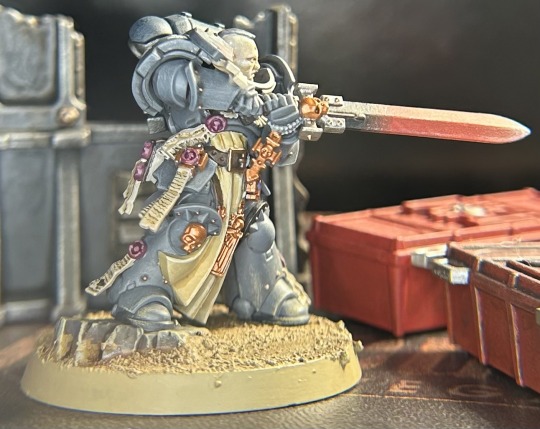
When such a brother’s skill is revealed the current Headsman of their company seeks out the chaplaincy. Its members assess the warrior’s chosen prospect. If found worthy they will declare “Aspirant Rising”, a ritual duel wherein the Headsman will be pitted against their chosen successor.
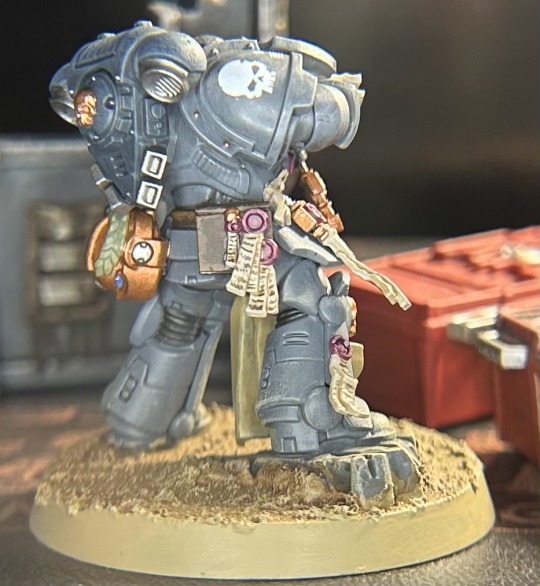
(Every headsman bears a book of ancestors. Within its pages are the names and remembered deeds of every champion and aspirant who has fallen in that company’s name. It is a holy relic, not one a headsman will part with willingly.)
Though the claimed intent of the duel is for the warrior to defeat the Headsman, none has ever done so. The reality is for the champion to see, with their own eyes and blade, if the aspiring warrior could be worthy of the title. Should they pass they will be granted the Red Skull honors. From that point forward they will be deployed only ever in strike forces or crusades containing the Headsman, the intention that they be kept near. In the event of the Headsman’s death, the aspirant will be given the fallen’s brain in a Soul’s Continuation ritual and rise to the rank of Headsman.

From that day forward his life will be spent between meditative communication with the lingering spirit of past champions, training, and battle. His only duty to seek out the strongest foes upon countless battlefields and destroy them.

(Tolvern is one of the remaining brothers from before the chapter’s Primaris reinforcement. Taking to his new enhancements, his bodycount of xenos and heretic grows ever higher.)
#warhamer 40000#space marines#warhammer#adeptus astartes#skulls sanctus#champion#primaris space marines#warhammer 40k#lore#oc lore#lore post
17 notes
·
View notes
Text
Biblical_Theology_Handout_-_Lesson_1.pdf
Biblical_Theology_Handout_-_Lesson_1.pdf https://share.google/ngbVHXS43BMOQLPiV
Skip to content
SearchSearch
Grace Theological Seminary
Menu
Close
Programs
Back
Programs
Master of Divinity (Online)
Back
Master of Divinity (Online)
Chaplaincy Program, M.Div. Online
Christian Ministry, M.Div. Online
Exegetical Studies, M.Div. Online
General Studies, M.Div. Online
Intercultural Studies, M.Div. Online
Pastoral Counseling, M.Div. Online
Pastoral Studies, M.Div. Online
Master of Divinity General Ministry (Deploy)
Master of Divinity (Residential)
Back
Master of Divinity (Residential)
Chaplaincy Program, M.Div.
Christian Ministry, M.Div.
Exegetical Studies, M.Div.
General Studies, M.Div.
Intercultural Studies, M.Div.
Pastoral Counseling, M.Div.
Pastoral Studies, M.Div.
Women’s Leadership, M.Div.
Master of Arts (Online)
Back
Master of Arts (Online)
Expository Preaching and Teaching Concentration, Master of Arts Online Degree in Christian Ministry
Chaplaincy Concentration, Master of Arts in Christian Ministry Online
Master of Arts Local Church Ministry Degree (Deploy)
Master of Arts in Military Chaplaincy Online
Master of Arts in Ministry Studies Online
Intercultural Studies Concentration, Master of Arts in Christian Ministry Online
Local Church Studies Concentration, Master of Arts in Christian Ministry Online
Women’s Leadership, Master of Arts in Christian Ministry Online
Master of Arts (Residential)
Back
Master of Arts (Residential)
Expository Preaching and Teaching Concentration, Master of Arts in Christian Ministry
Chaplaincy Concentration, Master of Arts in Christian Ministry
Intercultural Studies, Master of Arts in Christian Ministry
Local Church Studies, Master of Arts in Christian Ministry
Master of Arts in Military Chaplaincy
Women’s Leadership, Master of Arts in Christian Ministry
Worship Leadership Concentration, Master of Arts in Christian Ministry
Akron Master of Arts in Christian Ministry, Local Church Studies
Doctoral Programs
Back
Doctoral Programs
Doctor of Ministry, Biblical Spiritual Formation and Soul Care Concentration
Doctor of Ministry, Emerging Technology and Christian Ministry Concentration
Doctor of Ministry, Exemplary Biblical Preaching Concentration
Doctor of Ministry Online, Hybrid Church Concentration
Doctor of Ministry, Intercultural Studies
Doctor of Ministry, Interdisciplinary Studies
Doctor of Ministry, Ministry Leadership
Doctor of Ministry Online, Ministry Leadership Concentration
Doctor of Intercultural Studies
About
Back
About
Mission & History
Faculty & Staff
Seminary Accreditations, Affiliations & Authorizations
Diversity Statement
Admissions
Back
Admissions
Financial Aid
Tuition and Cost
Transfer Credits
Academic Catalog
Academic Calendar
FAQs
Class Schedules
Visit Grace Seminary
Delivery Methods
Back
Delivery Methods
Residential Masters Degrees
Online Seminary Degrees
Deploy | Online Seminary
Accelerated Program
Hybrid Doctoral Degrees
Compare Delivery Methods
Resources
Back
Resources
Center for Thriving Leaders
Library
Blog
Podcast
Videos
Ministry Position Opportunities
Calendar
Apply Now
Request Info
Home » Resources » Blog » What are the Four Types of Theology? Answers from a Theology School
December 16, 2020
What are the Four Types of Theology? Answers from a Theology School
Written By Grace Theological Seminary

Theology is the study of God, God’s character, God’s actions in relation to the cosmos, and especially God’s relationship to humanity (the character and history of humankind) in its responsive relationship to God within the panorama of the world and history, space, and time.
The breadth and complexity of theology’s subject matter are unrivaled among human sciences. This creates utterly unique challenges for theological reflection. Over the centuries, theology schools have developed ways of organizing this complexity that make theology more manageable. Presently, a common way of approaching this organization is to differentiate theology into four areas of focus. So what are the four types of theology?
The four types include biblical theology, historical theology, systematic (or dogmatic) theology, and practical theology. This arrangement was arrived at relatively recently, only settling in as such in the 19th and 20th centuries; for the majority of the history of theology, there was an assumed fluidity between these four. Rightly so: there is no consideration of the question of God in relation to humanity which does not invite all four of these dimensions of theology.
1. Biblical Theology
Biblical theology is focused on the specific ways that the discreet and unique authorial voices in Scripture reflect on the larger questions of theology and the relationships of actions and activities between God and human creatures. Biblical theology is undertaken by persons who are formed and practiced by their Christian faith, account for the historical currents that feed and flow in and through Scripture, and do so with full awareness of how the particular voices in Scripture rise together as a canonical choir, coordinating together in ways that are ultimately reflected in dogmatic theology.
2. Historical Theology
Historical theology, likewise, is undertaken within the practices of faith, paying specific attention to all the movements of human history from the perspective of biblically informed views of space and time, accounting for the dynamic movements of dogmatic theology and the practices of the Church.
3. Systematic Theology
The practices and reflections of systematic theology take up the canonical currents of Biblical theology, appropriating the theological voices of history. It does so with the full consciousness that dogmatic theology serves the Church as the people of God in her efforts to live and act faithfully in relation to her Creator, and Lord and Savior in the power of the Holy Spirit. Dogmatic theology’s goal is forming practiced faithfulness.
4. Practical Theology
Lastly, practical theology begins with the full consciousness that all the practices of the church and Christians are underwritten by theologies; biblical, historical, and systematic. The goal of practical theology is to reflect intentionally on present practices and their ingredient theologies in order to critically discern their shape and character so as to deeper faithful practices, correct those that are sinful, and discern with greater clarity how to live out biblical Christian virtues.
The strength of a fourfold organization of theology is its capacity to simplify the overwhelming and demanding complexity of the question of God and humanity; Father, Son, and Holy Spirit in all of the Trinity’s relations with human creatures against the backdrop of creation in both time and space. The challenge, and temptation, of this artificial organization within theology schools and otherwise, is to think of any of the four as discreet or independent.
Scientific cosmology describes human beings as existing simultaneously in four dimensions: height, length, depth, and time, all of which are implicit and necessary for defining the being and actions of human beings. Likewise, should we think of the necessity and mutuality of the four types of theology?
If you are asking questions like “What are the four types of theology?”, you might be looking for a theology school. Grace College and Theological Seminary explores all four types of theology under the instruction of expert faculty mentors.
Learn About Grace Theological Seminary

Mark Bowald
Alumnus of Grace College, earning a B.Sc. with a double major in Business Administration and Psychology in 1990. Earned an M.Div. at Grand Rapids Baptist Seminary and a Th.M. and Ph.D. in Theology at Wycliffe College in Toronto. 20+ years of experience teaching theology, advising and mentoring students at both undergraduate and seminary levels. Past Lecturer of Ministry and Spiritual Formation at Tyndale Seminary in Toronto and Theologian in Residence at St. James Church in Paris, Ontario. Previously, he taught for 11 years as Associate Professor of Theology at Redeemer University College in Ontario, Canada also serving as department chair. He serves as Canon Theologian and Examining Chaplain for the Diocese of the Great Lakes in the Anglican Church of North America.
Learn More
Share
Share On FacebookShare On Twitter
Tagged WithGrace Theological Seminary Dr. Mark Bowald

Subscribe to Our Blog
* indicates required
Email Address *
First Name *
Last Name
Search Resources
Search

Related News & Updates
Dedicated to teaching, training, and transforming the whole person for local church and global ministry
View All News & Updates

June 11, 2025
Grace Theological Seminary’s Dr. Thomas M. Stallter Releases ‘An Intervening Love’

October 15, 2024
Grace Theological Seminary Professor Releases New Book on Bible’s Use of the Bible
Reach Out
Interested in staying up to date with Grace Seminary?
Grace Theological Seminary
Programs
About
Admissions
Delivery Methods
Resources
Grace College and Seminary
200 Seminary Drive
Winona Lake, Indiana 46590
(574) 372-5100
© 2025 Grace Theological Seminary. All Rights Reserved.
FacebookTwitter
Seminary AccreditationsStudent Right to KnowTitle IX

0 notes
Text
Master of Divinity Online: Top MDiv Programs for Spiritual Leadership
The Master of Divinity (MDiv) is a foundational degree for those called to serve in ministry, pastoral care, or spiritual leadership. As faith communities and ministry roles evolve, so does the approach to theological education. Today, online MDiv programs offer a flexible and accessible pathway for individuals to gain deep spiritual insights, practical ministry skills, and leadership expertise without compromising their professional and personal commitments.
This guide explores the value of pursuing a Master of Divinity online, highlights the top programs available, and outlines how they prepare students for impactful spiritual leadership.
Why Choose an Online Master of Divinity Program?
1. Flexibility and Accessibility
Online MDiv programs enable students to study at their own pace, making it easier for working professionals, parents, and those in full-time ministry to pursue theological education.
2. Cost-Effectiveness
Compared to traditional on-campus programs, online masters of divinity programs often reduce tuition costs and eliminate expenses related to relocation and commuting.
3. Diverse Learning Environment
Online platforms connect students with peers and faculty worldwide, offering exposure to a broad spectrum of theological perspectives and cultural contexts.
4. Tailored Specializations
Many programs allow students to focus on areas such as pastoral counseling, chaplaincy, global missions, or worship leadership. This customization ensures the degree aligns with their unique calling.
5. Practical Ministry Integration
Most online Master of Divinity programs blend academic learning with real-world ministry experiences, equipping students with the tools to apply their knowledge effectively in their communities.
Key Components of an Online MDiv Program
Comprehensive Curriculum
A Master of Divinity degree online typically includes:
Biblical Studies: Detailed exploration of scriptures to understand their historical, cultural, and theological contexts.
Theology: Study of Christian doctrines and their practical implications in ministry.
Pastoral Care and Counseling: Developing skills for offering guidance, comfort, and support to individuals and families.
Church Leadership: Training in administration, conflict resolution, and organizational skills to lead faith communities effectively.
Ethics and Social Justice: Addressing moral and societal issues from a Christian perspective.
Field Education
Most programs require students to engage in internships or supervised ministry work, providing hands-on experience in real-world settings.
Thesis or Capstone Project
Many online masters of divinity programs include a final project where students synthesize their learning through research, reflection, and practical application.
Top Online MDiv Programs for Spiritual Leadership
1. Liberty University
Highlights: Liberty offers a robust Master of Divinity online program with multiple specializations, including chaplaincy, discipleship, and church planting.
Unique Feature: Flexible eight-week courses and experienced faculty committed to Christian values.
2. Fuller Theological Seminary
Highlights: Fuller's online MDiv program emphasizes integrating theology with cultural contexts.
Unique Feature: Offers a balance of academic rigor and practical ministry training.
3. Regent University
Highlights: Regent’s program focuses on leadership development, biblical studies, and practical theology.
Unique Feature: Customizable concentrations like marketplace ministry and spiritual formation.
4. Southeastern Baptist Theological Seminary
Highlights: This program emphasizes biblical faithfulness and practical ministry skills.
Unique Feature: Affordable tuition and a strong focus on global missions.
5. Denver Seminary
Highlights: Denver Seminary’s online MDiv program equips students for pastoral and missional roles.
Unique Feature: Strong emphasis on spiritual formation and ethical leadership.
Is an Online Master of Divinity Right for You?
An online Master of Divinity degree is ideal for:
Aspiring Pastors: Those preparing for ordination or leadership roles in churches.
Chaplains: Professionals seeking to serve in healthcare, military, or corporate chaplaincy.
Ministry Leaders: Individuals desiring to lead nonprofit organizations or missionary efforts.
Lifelong Learners: Those committed to deepening their faith and understanding of theology.
If you are driven by a passion for serving others and growing spiritually, an online Master of Divinity could be your next step toward impactful leadership.
What to Look for in an Online MDiv Program
When choosing an online masters of divinity program, consider these factors:
Accreditation: Ensure the institution is accredited by a recognized body, such as the Association of Theological Schools (ATS).
Faculty Expertise: Research the backgrounds and qualifications of professors to gauge the quality of instruction.
Flexibility: Look for programs that offer asynchronous learning or part-time options.
Cost: Compare tuition fees and financial aid options to find a program that fits your budget.
Specializations: Choose a program with concentrations aligned with your ministry goals.
The Path to Spiritual Leadership Starts Here
A Master of Divinity online equips individuals with the theological knowledge, practical skills, and spiritual depth required to lead and serve effectively. Whether you're preparing for ordination, exploring chaplaincy, or seeking to deepen your faith, online MDiv programs offer a transformative educational experience tailored to your needs.
Take the first step toward spiritual leadership by exploring the top online masters of divinity programs today. With the flexibility, affordability, and depth these programs provide, you can answer your calling while balancing your personal and professional life. For more information, read on St. Bernards’ official website today.
0 notes
Text

Charles Wellington Marvin, BJU Class of 1958.
Capt. Charles W. Marvin of San Diego, California, passed into eternal life on Sunday, May 5, 2024, at 88 years old. Known to many as ""Chuck"" or Chaplain Marvin, he proudly and faithfully served God and country as an active duty U.S. Navy chaplain for 27 years.
A committal service with military honors will be held in San Diego on June 7, 2024, at Miramar National Cemetery, 5795 Nobel Dr., at 11:15am. A memorial service will take place on June 8, 2024, at City View Church, 8404 Phyllis Place, at 10:30am (reception will follow). The family requests that attendees contact them at [email protected] for further information, especially for those planning to attend the Miramar committal service. Born on March 9, 1936, in St. Clair, Michigan, to parents Daisy Amanda (Isaacs) Marvin and Wayne Frank Marvin, Chuck was the seventh of 12 Marvin children (seven boys and five girls) and enjoyed recounting many lively adventures and mishaps from his childhood near the Pine River in St. Clair. Perhaps an early sign of his Navy future, Chuck once ventured onto a boat alone at three years old until his mother hauled him home. He retained a ""nothing ventured, nothing gained"" spirit throughout his life.
After graduating from St. Clair High School in 1953, Chuck enlisted in the Naval Submarine Reserves in Cleveland, Ohio. Between Chuck, his father, and six brothers, an immediate Marvin family member served in the Navy during every major conflict from World War I through the Gulf War. While a young reservist, Chuck attended Bob Jones University in Greenville, South Carolina, earning a B.A. in 1958, with a view toward ministry and the pastorate.
Chuck spent the first part of his career as a civilian. He served as assistant pastor in two churches in Cleveland and was ordained by the Ohio District Council of the Assemblies of God in 1962. While in Cleveland, he met Beverly Sliwinski at a district youth roller-skating event. Beverly was unimpressed at the time, but, not one to be easily deterred, Chuck won her over and they married on her twenty-first birthday in 1962. They remained devoted husband and wife for nearly 62 years until Chuck's death, and enjoyed decades of fruitful family life, ministry, and military moves and adventures, both foreign and domestic.
While serving as pastor of First Assembly of God in Duquesne, Pennsylvania, from 1964-1970, Chuck completed a divinity degree at Reformed Presbyterian Theological Seminary in Pittsburgh. He discerned a call to military chaplaincy and was commissioned as a Navy lieutenant and entered active duty in 1971 at age 35. In 1979, Chuck was selected for Naval Postgraduate School and attended Princeton Theological Seminary, receiving his Master of Theology degree in 1980.
Both Chuck and Beverly thoroughly enjoyed military life and cherished the friends they made and kept throughout their many moves and various duty stations. Their two years in Holy Loch, Scotland, aboard the U.S.S. Holland in the late 1970s sparked a lifelong family love for Great Britain, where Chuck had a ball golfing on the picturesque Scottish courses and Beverly and their three daughters enjoyed the port town of Dunoon and trips to Glasgow. Other duty stations saw Chuck serving as senior chaplain aboard the carrier U.S.S. Independence (where son Matt enjoyed dependent cruises and sonic booms!), preparing the ministry that would be provided to sailors and Marines during the Gulf War, conducting funerals at Arlington National Cemetery, ministering at Navy chapels on Guam and in Washington, D.C., and providing comprehensive pastoral ministry to recruits at a trio of different boot camps.
Chaplain Marvin held a special place in his heart for the Marines he served, earning their respect and camaraderie by opting to participate in their rigorous physical training even though it was not required of him as a chaplain. His many honors included the Legion of Merit awarded by the Marine Corps for exceptionally meritorious conduct in performing outstanding service.
Capt. Marvin retired from the Navy on March 31, 1998, as assistant chief of staff for religious ministries at Marine Corps Recruit Depot, San Diego. A decorated naval officer, Chuck served honorably and wholeheartedly as an armed forces chaplain who was known, loved, and regarded for being an ebullient and personable minister of the gospel. He blended personal and professional integrity with reverence for God, down-to-earth humor, and genuine love for the men and women he served. He excelled at offering spiritual and practical counsel and mentoring and was quick to listen to and encourage his fellow servicemen and women. Following his Navy retirement, Chuck served for nearly eight years as director of chaplaincy ministries and endorsing agent for the Assemblies of God, headquartered in Springfield, Missouri.
Chuck was a true people person. His glass was always at least half full, if not spilling over and splashing everyone around him with his contagious love for life. He laughed easily and heartily, even at his own jokes. He was as comfortable rolling up his sleeves and getting greasy doing manual labor and repairs as he was conducting weddings, funerals, and baptisms or preaching and administering communion on a Sunday morning. He lifted others up both in word and deed, whether neighbors, strangers, parishioners, fellow church members, colleagues, friends or family.
Chuck is lovingly honored and survived by his wife, Beverly Marvin; daughters Julie Randolph, Beverly ""Mandy"" Marvin, and Sara Daniel, and son, Matthew ""Matt"" Marvin; sons-in-law (and worthy opponents in golf, tennis, and Scrabble) Richard ""Rick"" Randolph and Charles ""Clay"" Daniel; grandchildren Emily Randolph, Ian Randolph (Victoria), Brandon Randolph, Knox Daniel, Leo Marvin, and Lacy Daniel; great-granddaughter and namesake Charlotte ""Charlie"" Randolph; five of his siblings--Robert ""Bob"", Glenn, Gladys (Ron), Ann (Larry), and Elsa; and numerous cherished Marvin nieces, nephews, and other extended family members.
In lieu of flowers, memorial donations may be made to the Chuck and Beverly Marvin Military Chaplain Scholarship fund by emailing Linda Ragain at [email protected], or to support Assemblies of God chaplaincy ministries at https://giving.ag.org/donate/700001-583366.
#Bob Jones University#BJU Alumni Association#Obituary#BJU Hall of Fame#Charles Wellington Marvin#Class of 1958
0 notes
Text
Why Consider a Graduate Degree in Theology?
In today’s busy world, people want more than just a successful career—they’re looking for meaning and a stronger connection to their values and beliefs. If you have a passion for faith and want to make a real difference in your community, a graduate degree from Okanagan Bible College is a great way to grow in your understanding of faith. It also prepares you for leadership roles in ministry, education, and other areas where you can lead and serve others.
In this blog, we’ll explore the reasons why pursuing a graduate degree in theology is not only a personally fulfilling path but also a professionally empowering one.

1. Deepen Your Theological Knowledge
At its core, a graduate degree in theology provides an opportunity to immerse yourself in the study of God, Scripture, and Christian doctrine at a deeper level. Undergraduate studies lay the groundwork, but graduate programs challenge students to go further in their exploration of faith and theological principles.
The depth of study allows you to engage critically with complex theological concepts, wrestle with ethical questions, and refine your understanding of Christian history and tradition. Whether you’re passionate about biblical studies, systematic theology, or Christian ethics, a graduate program gives you the tools to explore these subjects with academic rigor. This deeper understanding not only enriches your own spiritual journey but also equips you to serve others with greater wisdom and insight.
2. Strengthen Leadership Skills for Ministry
A graduate degree in theology is not just about intellectual growth—it’s about practical leadership development. Many people who pursue advanced theological studies are already serving in ministry, but a graduate degree can enhance their leadership abilities, making them more effective in their roles.
Graduate programs often include coursework in pastoral leadership, ministry management, and counseling, all aimed at helping students become strong, compassionate leaders. These programs teach you how to guide congregations, lead Christian organizations, and support individuals in their spiritual journeys. In today’s world, where church leaders are faced with increasingly complex issues, from social justice to mental health, the leadership skills gained through a theology graduate program are essential for modern ministry.
3. Open Doors to New Career Opportunities
A graduate degree in theology is often associated with ministry roles, but the career opportunities extend far beyond the pulpit. While many graduates do go on to become pastors, chaplains, and ministry leaders, others find fulfilling careers in education, counseling, non-profit work, and more.
For example, with a Master of Divinity or Master of Theological Studies, you can pursue roles as a professor of theology, religious educator, or academic researcher. Many faith-based schools and colleges look for leaders with advanced theological degrees to teach and mentor the next generation of Christian leaders. Similarly, chaplaincy in hospitals, prisons, and military settings is a growing field that requires specialized theological training.
Moreover, those with a heart for social justice and community outreach often use their theological education to lead non-profits, advocacy organizations, and humanitarian efforts. These graduates are equipped to bring a faith-centered perspective to social work, policy-making, and community service. In these roles, a graduate degree in theology not only opens doors but also provides a platform for creating meaningful change.
4. Gain Personal and Spiritual Growth
One of the most rewarding aspects of pursuing a graduate degree in theology is the opportunity for personal and spiritual growth. Theological studies invite you to wrestle with big questions about faith, purpose, suffering, and salvation. They challenge you to think deeply about your beliefs, refine your spiritual practices, and engage with Scripture in a more profound way.
In addition to academic knowledge, graduate theology programs often include spiritual formation courses, retreats, and mentoring, designed to help you grow in your relationship with God. This growth not only enriches your personal life but also enhances your ability to lead others on their spiritual journeys.

5. Address Contemporary Issues with a Biblical Perspective
As society becomes increasingly secular and diverse, Christian leaders are often called to address complex social, ethical, and moral issues. A graduate degree in theology equips you to engage with these challenges from a biblical perspective. Whether it’s questions about justice, human dignity, or the role of the church in a pluralistic world, a theology degree gives you the tools to think critically and act faithfully.
Graduate programs in theology often include coursework on contemporary issues such as bioethics, social justice, and interfaith dialogue. This education enables you to speak into these issues with theological insight and pastoral sensitivity. Whether you’re leading a congregation, working in a non-profit, or teaching, your ability to engage thoughtfully with the pressing issues of the day will be a valuable asset to your community.
6. Prepare for Advanced Ministry Roles
For those already in ministry, a graduate degree can be the next step in preparing for advanced roles. Whether you’re aiming to become a senior pastor, lead a multi-site church, or take on a specialized role in Christian education, counseling, or missions, a graduate degree provides the academic and practical training needed for these positions.
Many denominations and churches require or highly recommend advanced theological degrees for leadership positions. Earning a Master of Divinity (M.Div.) or a similar degree is often a requirement for ordination or senior leadership roles. Even if it’s not a formal requirement, having an advanced degree signals your commitment to your faith and your professional development, making you a more competitive candidate for leadership roles.
7. Develop Lifelong Learning and Research Skills
The pursuit of a graduate degree in theology fosters a mindset of lifelong learning. Theological studies are not static; they involve constant engagement with new ideas, historical texts, and contemporary scholarship. As a graduate student, you’ll develop critical research and analytical skills that will serve you throughout your life and ministry.
In a graduate theology program, you’ll have the opportunity to write in-depth research papers, participate in theological debates, and engage with diverse perspectives. These experiences refine your ability to think critically, argue persuasively, and communicate effectively—skills that are essential in both ministry and academia.
Conclusion
A graduate degree in theology is a life-changing journey that offers more than just academic success. It helps you develop wisdom for leadership, tackle today’s challenges, and grow both personally and spiritually. Whether you're already working in ministry or seeking to strengthen your faith and broaden your career options, a graduate degree in theology can open new doors to your potential. Apply now for a bright future in education!
0 notes
Link
1 note
·
View note
Text
Dawn Legion Personnel Roster
WARNING: CLASSIFIED DOCUMENT
Unauthorized copying, distribution, or redistribution of this document is a punishable offence.
Input security credentials to continue...

First Captain Laura, Master of the Tecuani
Personal bodyguard and champion of the Primarch, as well as the master of the Primarch's honour guard.
Tecuani Honor Guard: Nau || Cotaya || Xenhuan || Citalicue || Ixtli || Metzhli || Patli || Quetzalli || Teicuih || Tlanextic

Second Captain Tozi, Quartermistress
Responsible for the inventory and distribution of the Legion's supplies. Also oversees food and water production.
Logistratum: Azti || Supply Team "Constellation" ||

Third Captain Celaya, Master of the Fleet
Responsible for the Dawn Legion's fleet. Takes command of the fleet when the Primarch is indisposed. By technicality, also controls the Legionary Aeronautica; this job is usually deferred to the Overseer Aeronautica.
Naval Command Corps: Overseer Aeronautica Xihuitl || Flight Deck Overseer Eduin Waye ||

Techmarine-Primus Xipil, Fourth Captain, Master of the Armoury
Responsible for the maintenance and preservation of the Dawn Legion's weaponry, armour, and vehicles. Also commands the Destroyer Cadres.
Armour Corps: Chicahua ||

Fifth Captain, Lady-Outrider Anahuarque
Responsible for commanding the Scout Corps, also known as the Outriders, which performs overt reconnaissance and carries out raiding/harassment operations.

Scout Corps: Nochtli || Jaguar Company || Panther Teams ||
Sixth Captain and High Watcher, Master of Sentinels Ohtli
Responsible for the majority of the Dawn Legion's combat deployments; in particular, commands the Sentinel Corps, the elite forces dedicated solely to the protection and evacuation of civilians and noncombatants.
Sentinel Corps: Ahuic || Xitalli || Necahual || Calmainoc ||

Apothecary-Huntress Chimalma, Seventh Captain
Responsible for overseeing and commanding the Dawn Legion's medical corps, also known as the Apothecarion.
Apothecarion: Tochi || Hazardous Environ Unit || "Open Hand" Outreach Teams ||

Eighth Captain, Forgemaster Eztli
Responsible for overseeing the creation of additional armours, weapons, and gadgets, as well as all Legionary R&D. Also inducts new Techmarines and Tech-Adepts. Works closely with the Selenar Gene-Witches.
Techmarine Corps: Amoxti ||

Chief Librarian Altacoya, Ninth Captain, Master of Intelligence
Responsible for the Legionary Librarius. Due to all members of the Dawn Legion being psychic Blanks, the Librarius instead conducts spywork and covert intelligence-gathering.
Librarium:

Tenth Captain Tayanna, Promise of Hope
Responsible for the oversight of all Dawn Legion spiritual and ritual activities.
Chaplaincy: Master of Rites Chimalli ||

Additional Personnel
Inquisitor Kalli Asto || Farseer Taldeer || Liivi || Gunnery Chief Officer Kaiserin || Matriarch Amar-89 || Vox-Officer Lady Naisaiah Kell ||

#chronicles of the lost legion#First Captain Laura#The Tecuani#Quartermistress Tozi#Master of the Fleet Celaya#Techmarine-Primus Xipil#Lady-Outrider Anahuarque#High Watcher Ohtli#Apothecary-Huntress Chimalma#Forgemaster Eztli#Chief Librarian Altacoya#Promise of Hope Tayanna#Matriarch Amar-89#Inquisitor Kalli Asto#Farseer Taldeer#Liivi
1 note
·
View note
Text
What exactly Are You Going to Do with A Divinity Master?
A Master of Divinity degree confers profound theological knowledge, religious studies expertise, and valuable ministry abilities, marking a significant academic and spiritual achievement. The versatility of this degree opens diverse career opportunities both within and outside conventional religious contexts.
For individuals aspiring to ordained ministry, the Master of Divinity online degree serves as a requisite professional degree in many religious traditions, particularly within Christian denominations. However, its applicability extends beyond traditional roles, encompassing various professions involving religious and spiritual leadership.
Career Paths:
Ordained Ministry: Graduates often pursue leadership roles as pastors, priests, ministers, or rabbis within their respective religious communities, leveraging their comprehensive theological education for pastoral and spiritual responsibilities.
Chaplaincy: M.Div. graduates find fulfillment in chaplaincy roles, offering spiritual care in diverse settings such as hospitals, prisons, military, and educational institutions, combining pastoral practice and theological study.
Social Justice and Nonprofit Work: Grounded in ethical principles, M.Div. holders contribute to social justice and nonprofit endeavors, addressing issues like injustice, poverty, and human rights through faith-based or secular organizations.
Counseling and Mental Health Services: Equipped with pastoral counseling training, graduates are well-suited for roles in mental health services, potentially pursuing licensure as therapists while incorporating religious perspectives into therapy.
Community Engagement and Outreach: Many contribute to community outreach, partnering with churches to address local needs, organizing events, and fostering alliances to enhance the welfare of individuals and communities.
Writing and Publishing: Those with a passion for communication find opportunities in publishing, journalism, or writing, sharing insights and thoughts through papers, online platforms, or contributions to religious publications.
Interfaith Discussion and Relations: Graduates of M.Div programs are essential in advancing interfaith understanding since they work for institutions that support tolerance and collaboration among people of different religious backgrounds.
Missionary Work: The degree serves as a foundation for missionary work in international contexts, involving community development, evangelism, and cross-cultural missions.
Innovation and Entrepreneurship: Faculty and alumni often use their expertise to launch businesses, such as faith-based nonprofits or creative ministries, addressing modern spiritual and social needs.
Benefits of Online Master of Divinity Programs:
A Master of Divinity (M.Div.) degree is a highly advantageous degree that provides a broad and adaptable credentials for those seeking leadership positions in the religious, spiritual, or communal domains. Principal advantages include:
Theological Knowledge: M.Div. programs offer a thorough theological education that gives graduates a deep comprehension of religious concepts, beliefs, and practices.
Ministry Preparation: The M.Div. program prepares graduates for leadership roles in religious organizations, including pastoral counseling, preaching, and spiritual mentoring.
Career Versatility: Although they online mdiv programs are typically connected with ordained ministry, it can be used to pursue a variety of career pathways, including writing, community service, social justice work, chaplaincy, and counseling.
Community Building: M.Div. programs frequently place a strong emphasis on community participation, educating graduates how to create and maintain a welcoming environment in places of worship or other organizational settings.
Interfaith Understanding: In a world where religions are becoming more intertwined, graduates are prepared to participate in interfaith discussion and foster mutual understanding and cooperation.
Missionary Work: The online Master of Divinity programs can be a starting point for people who are interested in serving the world. It allows them to get involved in evangelism, community development, and cross-cultural missions.
Entrepreneurial Projects: Some alumni use their online mdiv programs expertise to start their own businesses, such as creative ministries, faith-based NGOs, or projects that address the spiritual and social concerns of the modern world.
A Master of Divinity degree prepares students for leadership roles in the religious, social, and communal domains by providing an all-encompassing education that goes beyond theological expertise.
Graduates of an adaptable and powerful online Master of Divinity program gain theological knowledge, leadership abilities, and interpersonal skills. People with an online Master of Divinity may significantly impact the world and their communities, whether they work in traditional religious settings or secular ones. If you want to know about the Master of Divinity degree, you can visit ST. Bernards website.
0 notes
Text
After the completion of an incredibly boring actual multi-month process, I’ve finally sat down and scalped through the entirety of my Sprue Mountain(TM), leaving me with a massive pile of loose plastic and a lot more space in my bedroom.
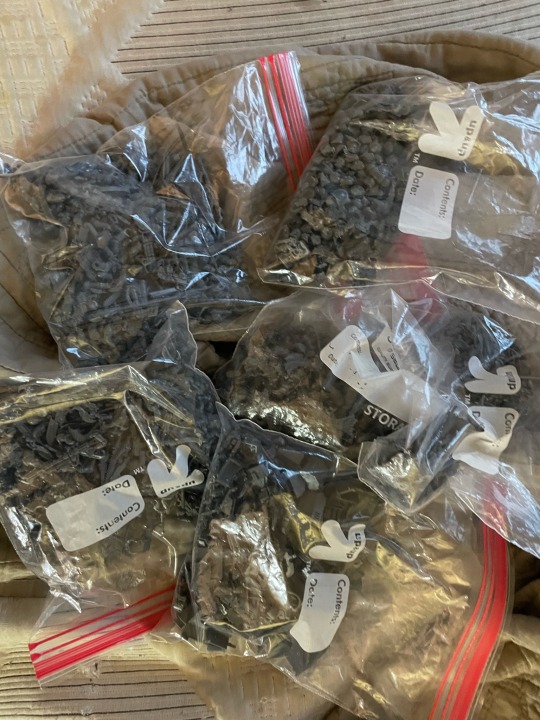
Contained within these veritable and disorganized bags is a disparate bank of bits, including a lot of Primaris Crusader Squads, Tzaangors, Tau, Thousand Sons, Chaos, Bloodletters, Necrons, and more. It’s incredibly unlikely that I’ll find a use for all of these, but it’s better to have and not need than to need and not have.
Moving on, around 6 months ago I tried making my first Redemptor Dreadnought, which was a horrible mistake. The custom bits were expensive and riddled with inappropriate Templars iconography, the shoulders were built incorrectly, and it was posed poorly. I ended up selling that first Redemptor to my brother, whose Cobalt Lancers now use it as a backup Dreadnought.
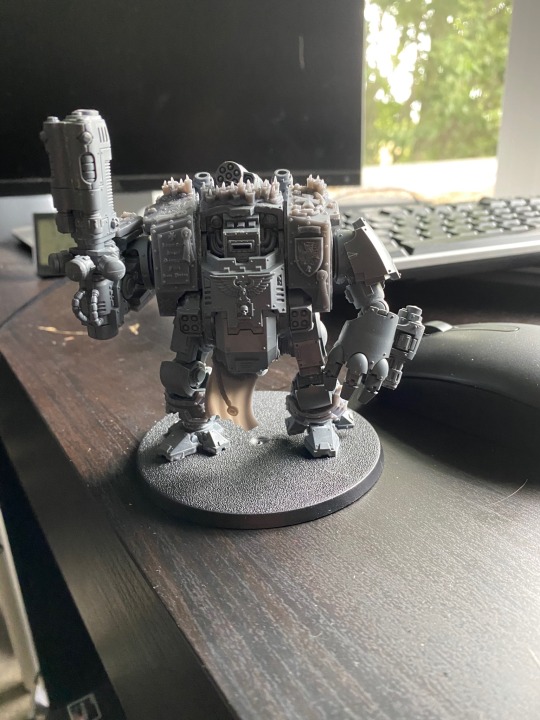
(My first Redemptor, after having been fixed and re-posed by my brother)
Since then, however, my kitbashing skills have improved pretty substantially, and as I gear towards competitive play, the need for an actually viable Dreadnought grows. It’s strange to have an Astartes collection in late 9th without at least one Redemptor Dreadnought, after all. Due to all this, I decided I’d give the Redemptor kit another try, and I think it went a lot better this time around!
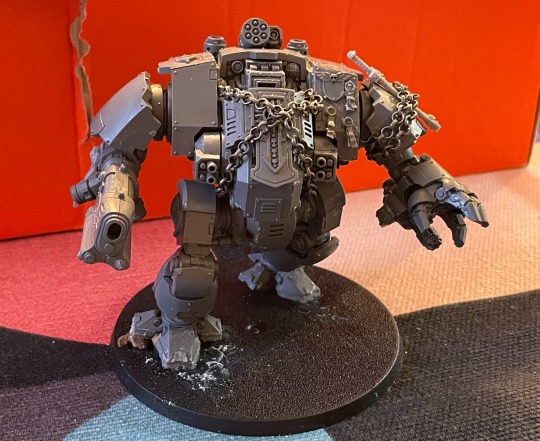
(The posing on this motherfucker was so difficult for no reason)
Entombed within this monstrous Dreadnought chassis is Bladeguard Sergeant Turles Galahad, who would become perhaps the Chapter’s first Redemptor Dreadnought. Serving in the Indomitus Crusade, Sergeant Galahad was an infantry leader and melee combatant of remarkable potential, his path combat prowess leading him down the path of an eventual Captain promotion. Unfortunately, this shooting star’s burning trail was extinguished long before he could see substantial glory, as his potential was cut short with his life by a scattered shell fired from the barrel of a malefic Chaos Predator’s main gun.
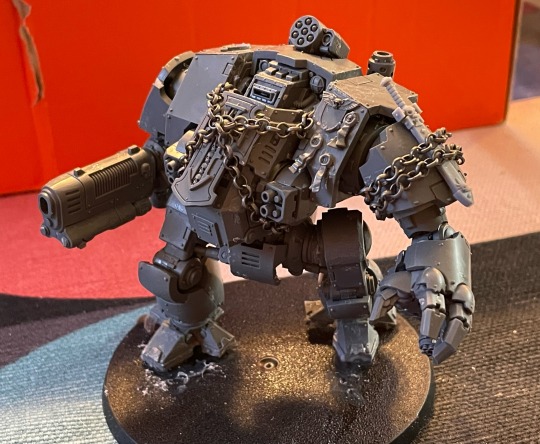
(One billion purity seals as is Thunderbearers standard practice)
The Techmarines attending to Brother Galahad anointed his Redemptor with the most holy of rites. As his relic shield failed him in his first life, they chained it to his coffin so as to protect him in his second. His master-crafted power sword is chained to his shoulder as a reminder of his expert swordsmanship, when he could still wield a sword.


(Blessed macro plas and fashionably blessed shoulder cape)
Shortly after the chassis’ anointment, Galahad was reawakened and set upon the battlefield. It is said that, upon his first awakening, Galahad’s macro plasma incinerator didn’t stop firing until he was recovered by the Chapter’s Techmarines, despite overheating numerous times. The constant, infernal ochre glow of the Dreadnought’s main weapon lead to him being nicknamed “the Burning Star,” and his incinerator being blessed thrice by his Techmarine retainers. Since the end of the Gale Sicane, Sergeant Galahad has grown quiet and somber, his waning machine personhood marked by a signature lost moroseness, unlike many of the Chapter’s other holy Dreadnoughts.
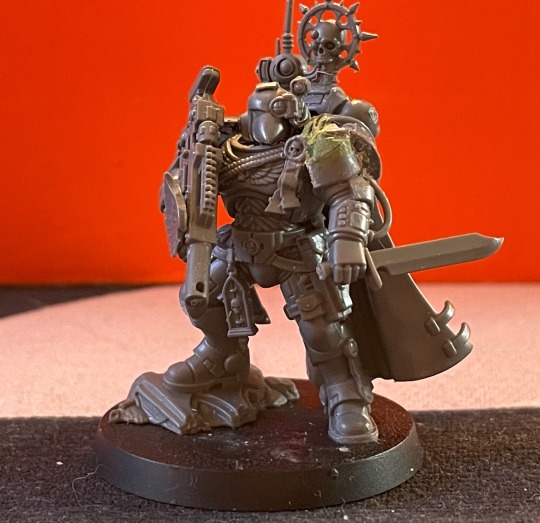
(10th Captain Vanion Sullist, Master of Reconnaissance and Priest of the Divine Kill)
Speaking of kitbashing, I was finally able to finish up my cool Phobos Captain conversion. I’m really proud of this model! The greenstuff work is quite messy because I’m very inexperienced, but it serves its purpose, I believe.
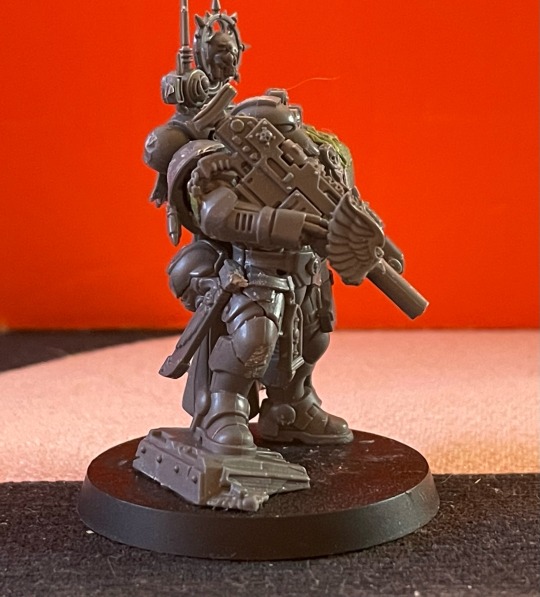
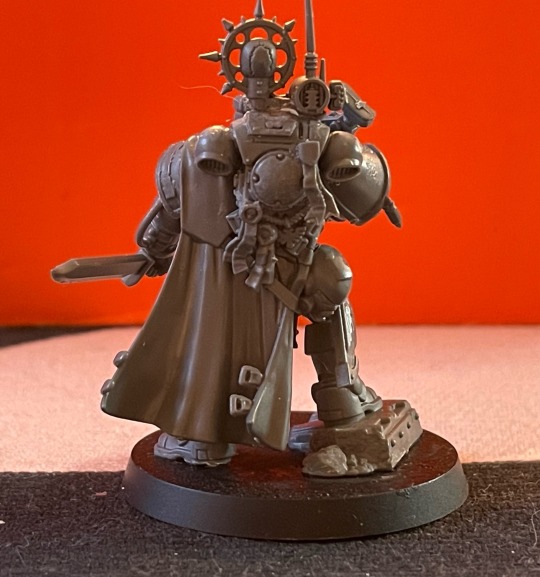
Regarding design choices, Sullist’s master-crafted instigator carbine is a custom, holy, artificed weapon, whose usage is reserved exclusively for those Astartes in Vanion’s position of the Chapter’s Chaplaincy, that being the Priest of the Divine Kill. What is that, though?
The Thunderbearers worship the holy sanctity of the bolter, viewing bolters and bolt technology as vessels of mankind’s fury. As such, much of both the Chapter’s ideology and way of war is centered around wielding as much overwhelming firepower as possible. There are, however, those Astartes that prefer to channel the Emperor’s rage into singular, precise strikes, as opposed to wielding it as a whirling storm. Those that follow this more controlled ideal follow the Divine Kill Doctrine, and the Priest of the Divine Kill is the Chaplain who oversees the spiritual health of those following said doctrine. As a fun fact, the vox-antenna on his backpack links him to every squad that follows the Divine Kill, including Eliminators, Reivers, and many other Phobos units. The channels between these troops are often nothing more than ceaseless encoded incantations, quiet litanies supreme death from the mouth of 10th Captain Sullist.

(Captain Sullist and his Chaplain buddy)
That’s all that I have for now. Next post will have some Intercessors, and a bit of bookkeeping. I will paint minis again someday, I swear.
39 notes
·
View notes
Text
Brider Surriss

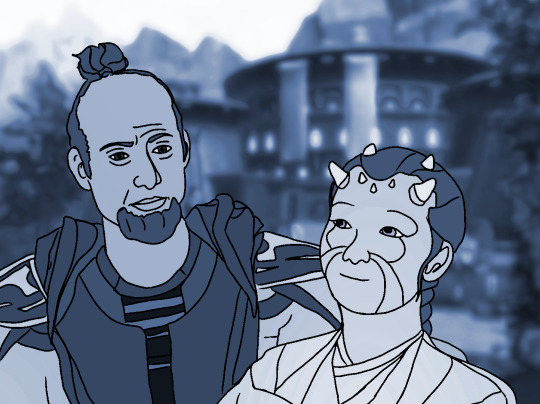

(first artwork by @0alix0. the second artwork is set in her prologue)
“War breaks Jedi like her.” “War breaks everyone. Jedi like her break war.”
she/her
Jedi Consular. Healer. Barsen'thor. Jedi Master. Mender of the Rift. Youngest member of the Jedi High Council. Of approximately equivalent position and status with Grand Master Satele (and eventual Grand Master herself). Devout orthodox Jedi. Utterly pacifistic (never attacks, only ever defends and heals).
Brider specializes in tutaminis, shielding others from harm by dispersing energy - whether from fires, noxious gases, or missile bombardment - into the Force.
Age at 10ATC: 16.
Species: Zabrak
Eye colour: green
Hair colour: brown
Skin colour: pale
Alignment: Light V, never earned a Dark point in her life
Lightsaber colour: frost green

(image by Ata @parseolegacy)
“I’ve never concerned myself with what people deserve. If they need my help, that’s more than enough reason for me to help them.”
Homeworld: Iridonia.
Other titles: Scorekeeper’s Herald; the Gentle Healer (title inherited from Syo Bakarn); Healing Word (Esh-ka name).
Closest friends: Qyzen Fess (whom she sometimes calls “Qy”); Felix Iresso; Satele Shan (post-Class Story).
Incorrigible sidequester and pacifier of gigantic, angry animals. Regards Syo Bakarn as her father. Utterly devastated by the events on Corellia.
Brider's lightsaber is very ornate, precisely because she doesn't use it - to her it's purely ceremonial/symbolic.
As well as the certification of Being A Jedi, Brider has qualified and registered with civilian bodies and is certified in trauma counselling, chaplaincy, emergency medicine and space-alien-equivalent-of-humanitarian aid. She did space online university while she was saving the galaxy, like many busy teenagers.
Tarot associations: Major Arcana - Strength (restraint, compassion, befriending the frightening, reigning in violent or destructive impulses, gentleness, immovable object, soft power, respected) Minor Arcana - Queen of Cups (support, care, compassion, unconditional love, intuitive, spiritual)
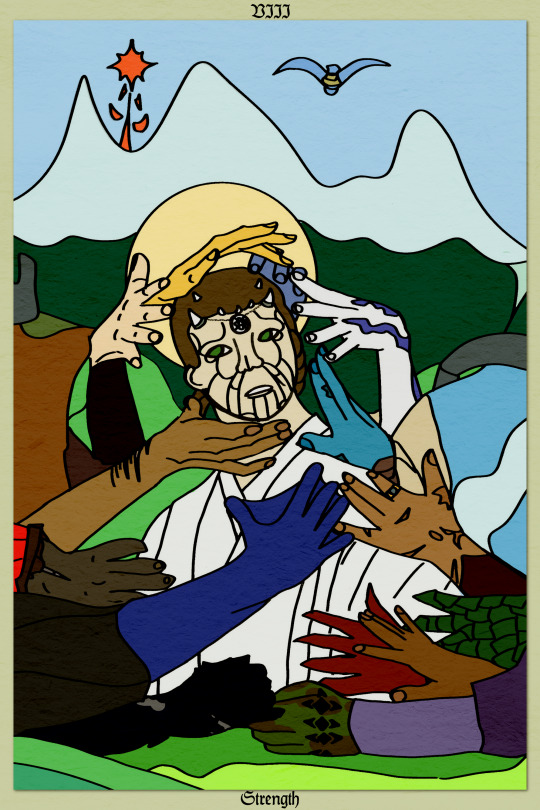
TESTIMONIALS:
“THE BABIEST OF JEDI I just wanna. cup her in my hands and put her in a cozy pocket or something” -Davi
“general disposition of a field of flowers” -Ata
17 notes
·
View notes
Text


@vmpire
there's a very long and convoluted story around why i decided to do a master's degree in theology but in simplest terms it was a completely spur of the moment decision. not something i'd pondered or thought about for a long time, even though i'd always been interested in religion. i basically decided to do it, applied, and was accepted in the span of a few weeks, so needless to say it was very compulsive but ultimately worked out in my favour, moreso than my previous plan for education (which had been to study english lit, a field i wasn't particularly keen on but felt pushed into by profs).
the reasoning for me behind studying theology was mainly that it had both practical and theoretical applications, moreso than in other fields. i felt, and still feel, that a lot of subjects in the arts/humanities are almost too theoretical and do not give students a broad enough practical application. i wanted a degree that would allow me to have a pastoral element to the philosophy and theory i already knew i was good at- i.e., the ability to learn things like counselling and advocacy. this is ultimately dependent on the school and program you enter (i'm very lucky to live within commuting distance of one of the best theology consortiums in the world, which has a huge catalogue of courses and specialities available).
all of this is to say that i've been figuring out what i want to do essentially as i've been doing the degree, and it was on my radar for a while to get my mdiv and become a minister. but ministry requires a certain amount of compliance in what is ultimately a very human and fallible institution, and that's not something that i feel right about morally, particularly given my own feelings on issues as important as the sacraments and magisterial authority. my goal at the moment is become a profess of theology and teach. i'm still considering whether i want to do this at a degree level or a school level (i have the option to qualify to teach gcses, for instance, which is fairly lucrative). i'm leaning towards the degree level as that would enable me to continue conducting theological research in my chosen field, which is very underresearched and underrepresented. another option i've seriously considered is chaplaincy, which has different requirements from ministry and more practical focus, as well as the option to be a non-denominational chaplain.
theology is full of white, cishet men. something like 90% of those who hold phds in theology are white cishet men, with the remaining percent being split between men of colour + all women + everyone else. for another thing, because of this overrepresentation of one group, the same topics and issues are being constantly rehashed, which means there is enormous possibility for new research and thought to be had in what is one of the oldest academic fields in existence- but i will also say that it requires a certain amount of spite and the ability to self-start, because i only discovered my particular niche with a lot of pushing and circumvention of the traditional avenues. (i.e., there's no field of sexual theology that exists, even though we need a sexual theology now more than ever, but there's far too many people researching evangelism or ecumenism, which are both outdated topics if we want to have a functional church in the post-secular age.)
its an incredible field- i strongly believe it to be the most elegant, beautiful, and difficult in the humanities. but it also needs more like you in it! so ultimately i would say: what does your heart want? my degree has, frequently, not been fun at all, but its also the most rewarding thing i've ever done and it is the place where i am happiest and perform to my highest personal calibre. the fact that i felt compelled to theology at all was a sign it was where i was meant to be. sorry this is a bit rambly and vague, but i hope it helps!
20 notes
·
View notes
Link
1 note
·
View note
Text
HOMILY for 13th Thur per annum (I)
Amos 7:10-17; Ps 18; Matt 9:1-8
Preached at a Day of Recollection for the Ethnic Chaplaincies of the Archdiocese of Westminster
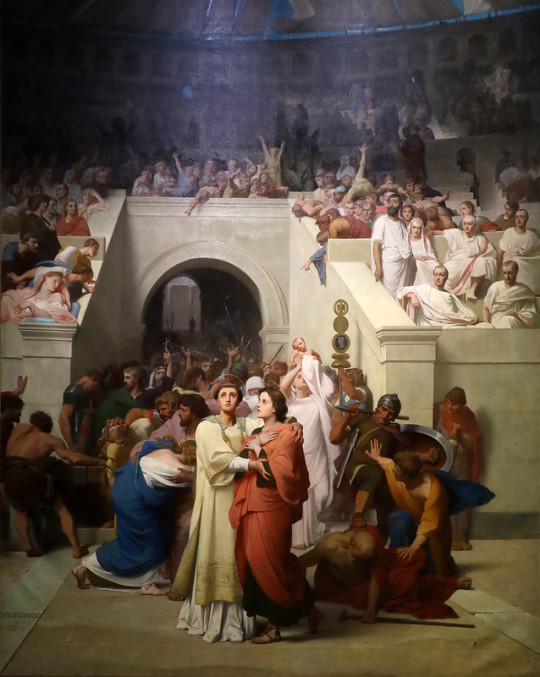
The protomartyrs of the Roman Church who were probably executed before Saints Peter and Paul, died under Nero in 64 AD. They were scapegoats of the Emperor, blamed for the inflagration of Rome. They were accused of atheism because they refused to worship the Roman pantheon, and this was regarded as gravely detrimental to the common good, and so the Christians of Rome were regarded as public enemy number one. Not much has changed.
In our time, as recent circumstances in the USA have demonstrated – and if you’re attentive to social media, Twitter and so on, you’ll have seen that the overturning of Roe v. Wade, which removed any constitutional right to abortion in the USA, a most right and just outcome that is the fruit of much prayer and penance – this has occasioned a wave of anti-Catholic sentiment and violence. Christians and particularly Catholics are now public enemy number one; our stance on abortion but on many other matters of sexual mores, have rendered us a danger to the public good for we simply will not kow-tow before the gods of our age. And so, Christians are hated and scapegoated. Why? Because the Catholic Church has spoken up for the vulnerable, for the voiceless, and indeed, offered a prophetic witness against the culture of death and the moral morass of our nations.
And it has ever been so, whenever a man or a woman, desiring to be faithful to the call of God, has tried to speak against the prevailing culture. Hence Amos, when he prophesied to Israel, was opposed and exiled. So, too, Our Lord, when he prophesied against the religious authorities of his time by exercising life-changing mercy and forgiveness, was also misunderstood, opposed, and exiled to death outside the city walls, perched on a hill over a rubbish dump.
But every true disciple of Christ, like those first martyrs of Rome, is prepared for this. For we know the promise of the Lord, this startling prophecy: “If the world hates you, know that it has hated me before it hated you. If you were of the world, the world would love its own; but because you are not of the world, but I chose you out of the world, therefore the world hates you. Remember the word that I said to you, `A servant is not greater than his master.' If they persecuted me, they will persecute you”. (John 15:18-20)
And so, in every age, we can expect to be persecuted, to be opposed, and to be hated, even. Why? Because the world, blinded by sin and addicted to its passions, hates the truth; it cannot recognise the true good, sadly. For as St Paul says to the Romans: “they exchanged the truth about God for a lie and worshiped and served the creature rather than the Creator”. (Rom 1:25) Indeed, a world that fails to recognise God as the ultimate Good will see the remedy of Christ’s Gospel to be a poison, and the peace it brings to be an act of violence against the sinful will. Thus Chesterton observed: “The Saint is a medicine because he is an antidote. Indeed that is why the saint is often a martyr; he is mistaken for a poison because he is an antidote. He will generally be found restoring the world to sanity by exaggerating whatever the world neglects… Each generation seeks its saint by instinct; and he is not what the people want, but rather what the people need.”
What does our world neglect in this age? What do we need? I could point to many things but, pertinent to the Gospel today, the world we live in knows not mercy or forgiveness. If you fail to worship the gods of the ruling classes, you will be cancelled, exiled, or even be subject to death threats. If you once held a viewpoint that is not acceptable to society now, the internet vigilante will seek out your youthful misdemeanours, defame you on social media, and execute you. Many people believe that they only have one chance, and then they’re out.
Understandably, many Christians are afraid of this kind of recrimination and for the sake of their jobs, or retaining so-called friends, or being accepted by society, they will not speak out; they will not witness to their faith. Many Catholics, therefore, espouse social mores and viewpoints that are barely distinguishable from the secular world’s. And yet, the Lord tells the true disciple: “If you were of the world, the world would love its own; but because you are not of the world, but I chose you out of the world, therefore the world hates you.” We must beware, therefore, the desire to be accepted and loved and comfortable in this life.
This desire prevails upon Catholics who come from overseas and from other cultures. Whereas initially they stick together and bear witness to their Faith in Christ, a joyful and vibrant and counter-cultural witness that we need in this land, yet over time and with the passage of the generations, they will be under tremendous pressure to conform and to worship at the altar of the gods of the day lest they be branded as atheists and executed as such.
Which is why we need often to remember the example of the martyrs. The first martyrs of Rome lived in a pagan culture completely foreign to Christianity and hostile to the Faith, not dissimilar from our times, and perhaps still worse. Yet they clung to Christ, to their hope in the Resurrection, and to a truth – the joy of the Gospel – that changed their lives. We need their fortitude and faith in our lives and in our ministries. Likewise, we need to recall the words and the example of the Lord. Firstly, that we can expect to be opposed and hated. But in the face of the world’s hatred, our witness must be one of steadfast mercy and love. The Lord, too, demands this of us disciples. For “if you love those who love you, what credit is that to you? For even sinners love those who love them.” (Lk 6:32) Rather, we have been called to become Saints, to become the antidote for our age, to restore the world to sanity. And so, we must do as Christ does and Christ says: “love your enemies, and do good, and lend, expecting nothing in return; and your reward will be great, and you will be sons of the Most High; for he is kind to the ungrateful and the selfish. Be merciful, even as your Father is merciful.” (Lk 6:35-36)
As children of our heavenly Father, and as servants of God’s people in this diocese, so let us follow the Master, and let us, without naivety, build a culture of mercy, forgiveness, and magnanimous hospitality. The synodal process that we have been invited to undergo points to this hospitality. Above all, it points to the way of charity which is not possible without the willingness to suffer and die to ourselves. For listening and dialogue are not ends in themselves, and indeed they risk becoming tired catchphrases, lacking in authenticity if we have not love. So St Paul says, famously: “Love does not insist on its own way; it is not irritable or resentful; it does not rejoice at wrong, but rejoices in the right. Love bears all things, believes all things, hopes all things, endures all things.” (1 Cor 13:5-6) This is the virtue that shapes a synodal process worthy of our attention. Charity, therefore, is our goal for love is Christ’s response to hate, to the opposition of the world; Love is the final witness of the martyr; Love – true sacrificial love that doesn’t flinch from the truth but is also compassionate and merciful – is what the world needs.
I dare say that the Catholic justices in the USA, with their recent ruling against Roe, were giving their nation what it needed. Those in power often seem unable to admit wrongdoing, or to take responsibility, repent, and make restitution. But the Supreme Court of the USA, instead, was able to say that they’d sinned, they’d overstepped and missed the mark. Why could those justices do this? I’d like to think that, as Catholics, they were demonstrating the forgiveness and mercy of God which is the antidote that the world needs. Perhaps in their consciences they heard the Lord say: “Courage, my child, your sins are forgiven”, and so the legal paralysis of the past fifty years could be undone by the grace and mercy of God.
This example is given to us so that we, in our own country, might dare to do likewise. Let the mercy of God, and our Christian witness of his merciful love, unbind so many consciences who have been deadened and bound up by past sins; who fear condemnation; who do not yet understand that “the Son of Man has authority on earth to forgive sins” and so give us new life. We have tasted the forgiveness of Christ, we live the new life of grace, and so let us become instruments of God’s mercy and grace and truth to all whom we encounter, especially those who hate us!
3 notes
·
View notes